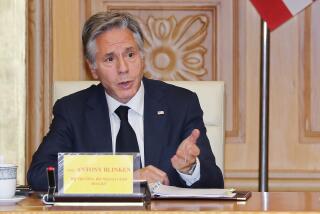Iran is pushing limits on nuclear deal, former Obama advisor warns
When Iran and the world powers trying to negotiate a nuclear deal announced late Friday that they would extend their five-month-old talks for an additional four months, they said they had been making “tangible progress” toward a deal.
But a former member of President Obama’s inner circle on the Iran issue says Iran is actually moving further from the six world powers on the most important issue of all: how much uranium enrichment capacity the Islamic Republic will be entitled to retain.
Robert Einhorn, who was a special advisor on arms control at the State Department until May 2013, says the Iranians have been quietly extending what they claim they are entitled to on enrichment -- what Einhorn calls “rights creep.”
He warns these demands could gridlock the negotiations.
Einhorn’s views carry some weight. He is not among those who have been opposed to deal-making from the start. Rather, he has been a supporter of the diplomacy, acknowledges there has been important progress on some issues, and favors the extension.
But he has been worried that the enrichment issue could be an insurmountable stumbling block.
Einhorn, now with the Brookings Institution, wrote in an article for the think tank’s website Saturday that for years Iran pushed to have the West acknowledge its right to enrich uranium.
Last year, the Obama administration publicly acknowledged for the first time that it could support Iran having a domestic enrichment program. But now Iran has gone further, contending that it is entitled to produce enough enriched uranium to supply what it hopes will be a huge nuclear power generation program.
The Iranians are now insisting that they be able to have that capability by 2021, although the six powers are demanding, so far, that the deal restricting Iranian nuclear capability should last at least 10 years.
Iran’s growing demands became publicly apparent July 7, when Supreme Leader Ayatollah Ali Khamenei said in a major speech that Iran needed an enrichment capacity that would require more than 100,000 first-generation centrifuges.
The six powers’ opening demand was that Iran be limited to 500 to 1,200 first-generation centrifuges.
Some advocates for a deal have insisted that Khamenei’s statements were a positive sign, because he showed flexibility in indicating that he wasn’t seeking this huge capacity right away. But Einhorn quotes Ali-Akhbar Salehi, head of Iran’s nuclear agency, as clarifying that, in fact, Iran wants the infrastructure in place by 2021.
Last week, Iranian Foreign Minister Javad Zarif disclosed that he had proposed that Iran be allowed to keep running its current operating inventory of 9,400 centrifuges, while not expanding it during the deal. Some Western officials, perhaps eager for signs of progress, claimed this showed a new flexibility from Tehran.
To the contrary, says Einhorn, Tehran’s position is now quite assertive.
Instead of cutting back its capacity to a fraction of what it is today, as the six are now demanding, it wants to keep operating all the machines that are now producing; pursue unlimited research and development; limit the duration of the deal to eight years or less; and be free to expand to industrial scale once the deal lapses.
If Iran sticks to these demands when talks resume, “it will ensure continued deadlock,” Einhorn warned.
Follow @Richtpau for news about U.S. foreign affairs
More to Read
Start your day right
Sign up for Essential California for news, features and recommendations from the L.A. Times and beyond in your inbox six days a week.
You may occasionally receive promotional content from the Los Angeles Times.







